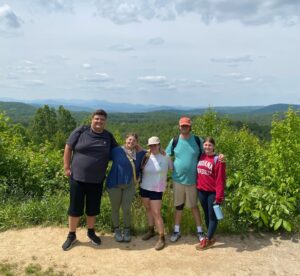Your Young Adult Is Struggling. Here’s What Parents Can Do.
If your 18–29-year-old feels stuck or anxious, these signs a young adult is struggling can help you decide what to do next. This parent guide covers failure-to-launch help, young adult depression and anxiety, and when a short residential program for young adults makes sense.
Why this matters now
Young adulthood (roughly ages 18–29) is full of “firsts”: first apartment, first job, first big bills, first serious relationships. During these transitions, anxiety, depression, ADHD, trauma, and substance use can easily derail progress—especially when executive functioning and independent-living skills (planning, time management, cooking, budgeting, and self-care) aren’t yet solid.
- More than 1 in 5 U.S. adults lives with a mental illness in a given year. Young adults consistently show the highest rates of any mental illness and serious mental illness compared to older age groups.
Quick checklist: typical ups & downs vs. red flags
Occasional stress, moodiness, or late assignments happen. Red flags are patterns that persist 2+ weeks, escalate, or impair school/work, relationships, or self-care.
Red flags to watch for
-
Pulling away: isolating from friends/family, skipping classes or shifts, staying in their room most days.
-
Marked changes: sleep flipped to nights, not eating or overeating, poor hygiene, headaches or stomachaches with no clear cause.
-
Executive function problems: can’t get started, piles of unfinished tasks, avoiding emails/calls, missing payments, losing jobs/classes.
-
Hopeless talk: “What’s the point?” “I’m a burden.” “I’ll never be successful.”
-
Increased risk: more alcohol or cannabis, impulsive driving/spending, self-harm.
-
Suicidality warning signs: talking about wanting to die, searching for methods, giving away belongings, saying goodbye. If present, act now (see “What to do next”).
Health basics matter: Most adults need more than 7 hours sleep nightly; chronic short sleep worsens mood, attention, and self-control.
15 common signs a young adult is quietly struggling
-
Loss of motivation / “stuck” feeling (quarter-life stall).
-
Languishing: not depressed enough to seek help, but joyless and unproductive.
-
Anxiety that runs life: avoidance of calls, emails, errands, classes, driving.
-
Depressive symptoms: low mood, guilt, worthlessness, fatigue, sleep/appetite changes.
-
Academic or work derailment: missed deadlines, withdrawals, probation, terminations.
-
Executive dysfunction: task-initiation paralysis, time blindness, disorganization (often overlaps ADHD).
-
Digital overuse & circadian flip: all-night scrolling/gaming, day sleep; social media can intensify anxiety, loneliness, and poor sleep.
-
Increased use of substances to cope.
-
Relationship volatility: conflict, isolation, or codependency.
-
Somatic complaints: headaches, GI upset, diffuse pain without medical cause.
-
Self-harm or risky behavior.
-
Weight or eating changes and body-image distress.
-
Financial spirals: late fees, overdrafts, borrowing, ignoring bills.
-
Hopeless or burden statements.
-
Suicidal ideation or behaviors—immediate action required.
What’s underneath: root causes parents often miss
-
Anxiety & depression that started in high school and intensified with adult stressors.
-
ADHD (frequently undiagnosed until college/work), showing up as chronic lateness, lost items, time blindness, impulsive spending, conflict, and burnout. Effective treatment typically combines medication and cognitive-behavioral strategies.
-
Trauma, grief, or social disconnection post-pandemic.
-
Sleep dysregulation (blue light at night), nutrition gaps, and sedentary routines—all proven to worsen mood and cognition.
-
Substance use that began as self-medication and now fuels anxiety/depression cycles.
-
Skill gaps in independent living: budgeting, meals, cleaning, conflict repair, job search.
How to talk to your young adult (scripts that work)
Your stance: curious, collaborative, non-fixing. Try open questions + reflections (a Motivational Interviewing approach linked to better engagement).
-
Notice + invite: “I’ve noticed classes and sleep have been tough lately. What’s the hardest part right now?”
-
Normalize + ask: “Lots of 20-somethings feel stuck. Would it help to look at a few options together?”
-
Support autonomy: “You’re in the driver’s seat. I can help research and handle logistics if you want.”
-
If safety risk: “I’m worried about your safety. Let’s call or text 988 together right now, or we can go to urgent care.”
When to get professional help (and which level of care)
-
Outpatient therapy (weekly): for mild to moderate symptoms with decent daily functioning.
-
Intensive Outpatient (IOP)/Partial Hospitalization (PHP): several days per week; for moderate to severe symptoms needing more structure without 24/7 care.
-
Residential programs: 24/7 therapeutic environment with daily structure, ideal when home routines, motivation, or executive functioning have collapsed—or when skills and social connection need immersive rebuilding.
Why families choose Skyterra Young Adult (SYA)
Setting: A small, residential therapeutic wellness program in the Blue Ridge Mountains of North Carolina for ages 18–29. Guests step away from daily noise to reset, heal, and build real-world independence.
Whole-person model, five pillars
-
Self-Care & Stress Management
-
Fitness & Mobility
-
Culinary & Nutrition
-
Recreation & Adventure
-
Wellness Community & Independent Living Skills
Therapeutic depth + life-skills breadth
-
Multiple private sessions weekly with licensed therapy, fitness, and nutrition professionals; group therapy centered on coping skills, communication, and life strategies.
-
Structured schedule that reduces isolation, increases belonging, and strengthens adaptive coping—protective factors for depression and suicidality.
-
Independent-living curriculum: budgeting, cooking, cleaning systems, job readiness, time management, conflict resolution.
-
Device boundaries and sleep hygiene to repair circadian rhythm and focus.
-
Since 2017, purpose-built for young adults; new campus opened 2021.
What’s included (high-value clarity for parents)
Accommodations, all meals, airport transportation, weekly private therapy, and the full schedule of classes, lectures, experiences, and coaching—everything needed to succeed while onsite.
What a progress-building week can look like
-
Morning: mindful movement; breakfast; skills group (distress tolerance, time-boxing, executive function strategies).
-
Mid-day: individual therapy; culinary lab (meal planning on a budget); academic/career block; nature-based recreation.
-
Afternoon/Evening: strength or mobility training; community dinner; wind-down routines (sleep prep, device limits), reflective journaling.
This consistent rhythm—movement, meals, therapy, skills, nature, rest—improves mood, attention, and self-efficacy.
Evidence-based methods you’ll see in action
-
CBT/behavioral activation for depressive thinking and avoidance.
-
DBT skills (emotion regulation, distress tolerance, interpersonal effectiveness) with growing evidence for reducing self-harm and suicidality in youth and young adults.
-
Motivational Interviewing to strengthen buy-in and readiness for change.
-
ADHD-informed coaching and routines (pairing therapy with skills, exercise, sleep, and structure) aligned with NIMH guidance for adult ADHD.
-
Movement + sleep + nutrition as clinical levers for executive functioning and mood.
Parent action plan (step-by-step)
-
Log observations for 1–2 weeks: sleep, nutrition, school/work, social, money, mood, substances.
-
Have the conversation (use the scripts above).
-
Screen safety: any suicidal talk, plans, or inability to care for self? If yes, call or text 988 now.
-
Match the level of care: if weekly therapy keeps collapsing or independence skills won’t stick, consider a time-bound residential reset like SYA.
-
Book a consult: SYA’s admissions team will help you assess fit and timing; the process is simple and collaborative.
-
Prepare together: discuss goals (sleep, job skills, mood, sobriety, fitness), agree on communication, celebrate small wins.
What success can look like
After several weeks in a structured, compassionate setting, most guests leave with:
-
A reliable daily rhythm (sleep, meals, movement).
-
Coping skills for anxiety/depression and a plan for continued care.
-
Executive-function systems: time-boxing, task batching, calendar hygiene, money basics.
-
Independent-living confidence: cooking, cleaning, conflict repair, sober socializing.
-
A forward plan: return to school, start or relaunch work, or map a gap semester with accountability.
What to do right now
-
Trust your gut. Patterns you’ve noticed probably signal a need for support.
-
Start the conversation using the scripts above.
-
If safety is a concern, call or text 988 immediately.
-
Explore fit with Skyterra Young Adult—a call with admissions can clarify whether a short residential reset is the right next step for your family.





